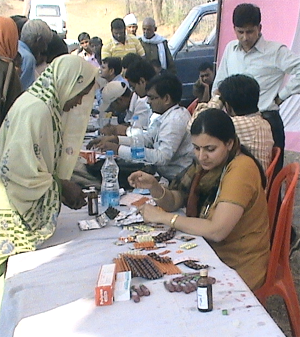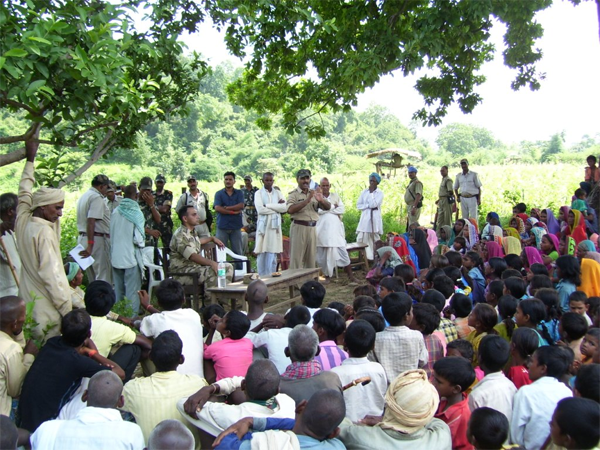Feb 05, 2026
Feb 05, 2026
by Alka Pande
 It is just another day for the energetic Dr Tanveer Aujula, who is in her thirties. As she patiently listens to each one of her patients, sometimes conducting a preliminary check up before giving them medicines, the crowds keep increasing. Dr Tanveer is an MS in gynaecology from Punjab University and this is her routine OPD (Out Patient Department) held under a tree in Mohouli, the last village in Sonbhadra district of Uttar Pradesh (UP).
It is just another day for the energetic Dr Tanveer Aujula, who is in her thirties. As she patiently listens to each one of her patients, sometimes conducting a preliminary check up before giving them medicines, the crowds keep increasing. Dr Tanveer is an MS in gynaecology from Punjab University and this is her routine OPD (Out Patient Department) held under a tree in Mohouli, the last village in Sonbhadra district of Uttar Pradesh (UP).
Homely and compassionate, Tanveer, who hails from Punjab, says, "It was my parents' dream that I become a doctor. I don't know when their dream became mine - so much so that I started writing doctor in front of my name even when I was in school."
Talking about her work, she says, "In UP, I started by volunteering to put up camps at police lines to educate people about hygiene, family welfare, and so on. Gradually, these camps became more regular and I started going to remote and interior areas to cater to the tribal people."
Tanveer is not alone in Sonbhadra. Her husband, Dr Pritinder Singh, joins in to attend to the male patients. Together they make an unusual couple providing health care to the people who need it most. Pritinder Singh has an additional qualification. He is also the Superintendent of Police (SP) in Sonbhadra. Whilst he is checking his patients, Singh asks them about the policing problems they may be facing in their village.
The particular reason behind Singh's inquiry is the community policing initiative that has been undertaken in Sonbhardra to deal with the challenges posed by extremists and criminal elements active in the region. Geographically, Sonbhadra is a unique district, as it shares borders with four states - Madhya Pradesh, Jharkhand, Bihar and Chhattisgarh. It has a rocky terrain but is richly endowed with natural resources and several industries have moved to the region. In fact, Hindalco has set up Asia's biggest aluminium factory here and there is also a cement plant run by the JayPee Group. Besides this, the various hydel projects in the area have helped to make the region a power generation hub, with 15,000 MWs of electricity being produced here.
Unfortunately, these natural riches seemed to have only helped make Sonbhadra poorer. It lacks even in basic infrastructure. For instance, villages located in the hilly areas do not have electricity, schools or access to medical facilities. And as cultivation is very difficult on this rocky terrain, the only way for people here to earn money is by selling local forest produce to urban traders.
It's this very lack of development and economic opportunity that has seen a rise in political extremism and criminalisation. And that is why community policing - which began in 2007 - has yielded good results here and has helped to change popular perceptions of the police being inhuman and uncaring.

The police force here has got involved with the development of the region. Every day about half-a-dozen teams visit different villages and talk to the local people about their problems. No village has been left out. Daily reports, based on the demands of the people, are given to the SP and copies are sent to District Magistrate, Chief Development Officer, Divisional Commissioner and other concerned officials.
People in Sonebhadra now approach the men in khaki with all sorts of problems - from those related to agriculture, education or health to how they can avail of government schemes. And help is forthcoming. For instance, when Batulan Khatoon of Mohouli village asked police officials to get check dams constructed in her village for rainwater harvesting, Amar Nath Yadav, the police officer in charge of surveillance, decided to solve the problem in another way - he asked his colleague, Sanjeev Mishra, the Mohouli outpost in-charge, to look into the possibility of papaya cultivation in the area since papaya trees grow easily here and do not require much water.
Singh came to know that there was no Primary Health Centre (PHC) or intermediate college within a radius of 30 kilometres of Mohouli after speaking to his patients. Now he has sent a proposal to the government for setting up five PHCs and an intermediate college in the area. "I have requested the government to relax the norms for setting up primary health centres and secondary level educational institutions for areas like ours," he says.
But besides being approachable to the locals and getting infrastructure built - all villages here are now linked by proper roads - community policing has a far more popular activity: The setting up of regular camps in villages by rotation, where various utility items, such as five kilo bags of rice and wheat flour, bicycles for meritorious students, clothes, school bags, books and saris, among others, are distributed. And as the annual budget for community policing is a mere Rs 5,00,000 (US$1=Rs 45.7), and the actual cost of a camp averages around Rs 3,00,000, local sources have been tapped for funding.
These efforts have borne results. The number of extremist and criminal gangs in the region has declined. Yadav reveals, "Three years back, there were 30-35 groups, now only three are active. No new recruitment has taken place over the last five years."
Taking the concept of community policing to a whole new level, Singh is making efforts to rehabilite political extremists, who have either surrendered or were arrested. Two months ago, mass marriages were organised in Kanaura village, where the SP performed 'kanya daan' (a ceremony performed usually by the bride's father) for the sister of a former extremist, and now he is looking out for a match for Sukhadi Mallah, who had given himself up.
Sincere efforts are being made to bring these men and women into the mainstream. Special driving classes for boys and sewing classes for women have been started. On their successfully completing the course, licences are provided to students of the driving school, while sewing machines are given to those who wish to take up tailoring. "We have negotiated with local units to employ these trained drivers and contracts to stitch the uniforms for the police have been provided to the women. These welfare activities involve men and women, who are out of jail and also for other villagers," says Singh, adding, "Twenty-five men released from jail, are now working under MGNREGA (Mahatma Gandhi National Rural Employment Guarantee Act) and hold proper job cards."
Singh is a happy man today. His reasons for joining the IPS, despite a flourishing medical practice, have been validated. And so has Tanveer's. Says she, "When we had to come from Punjab to UP initially it came as a shock to me but for family's sake I decided to accompany my husband. When I started working in this area I saw illiteracy and poverty from close quarters - children smeared in cow dung, and so on, which is so different from Punjab. The condition is much better even in the poorest of the poor areas of Punjab." And does she have any regrets? "Never, not even for a minute, as I believe that here my contribution to the society is much more substantial," quips the good doctor, adding, "Although what we are doing here is more like a drop in the ocean, there is so much more potential for good work here."
Her husband agrees. Says Singh, "Had we continued with our practice in Punjab, we would have built a big nursing home there and would have been earning millions, but how many people would have benefited from that, even if we gave free treatment to all the poor? Here, we touch the lives of thousands of people, every day."
By arrangement with WFS
02-Oct-2010
More by : Alka Pande